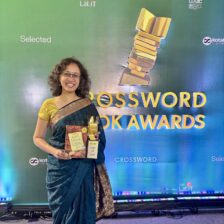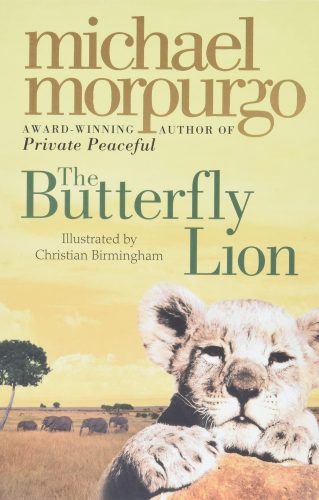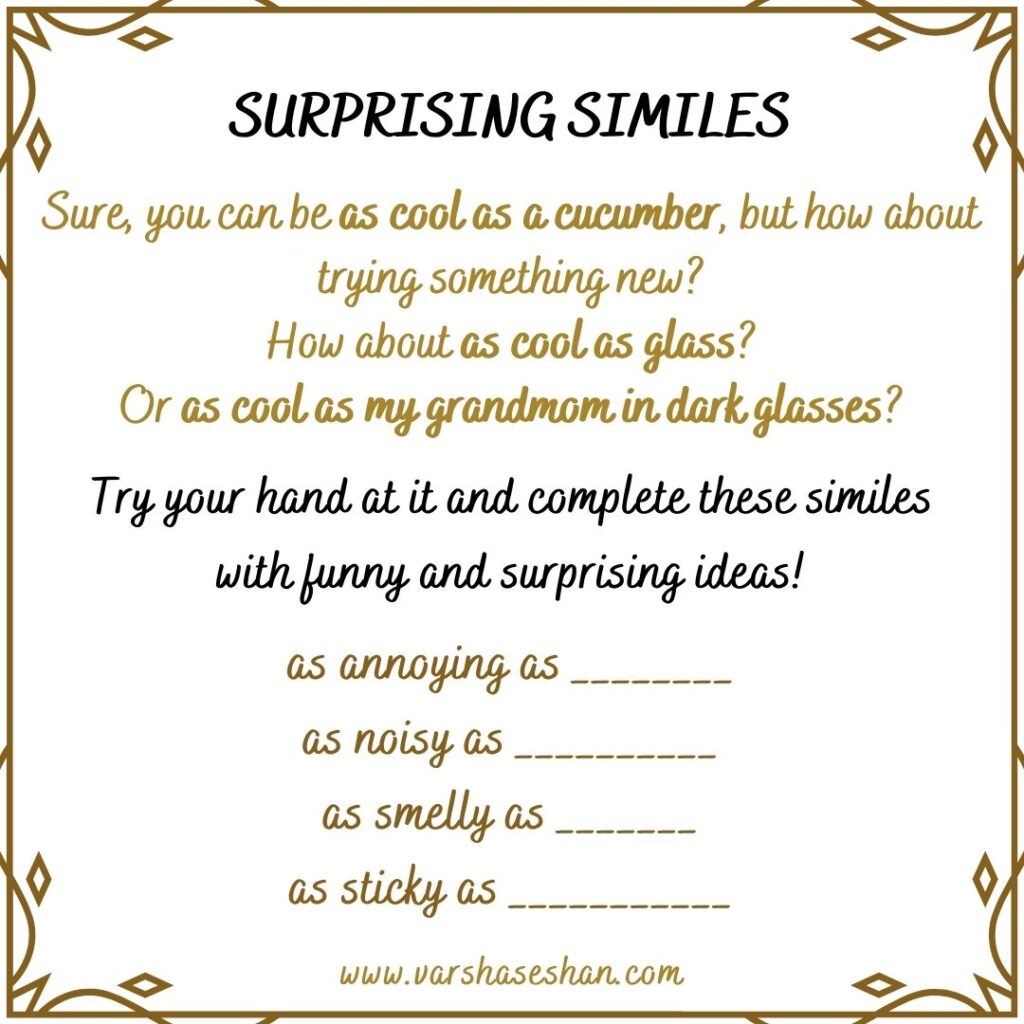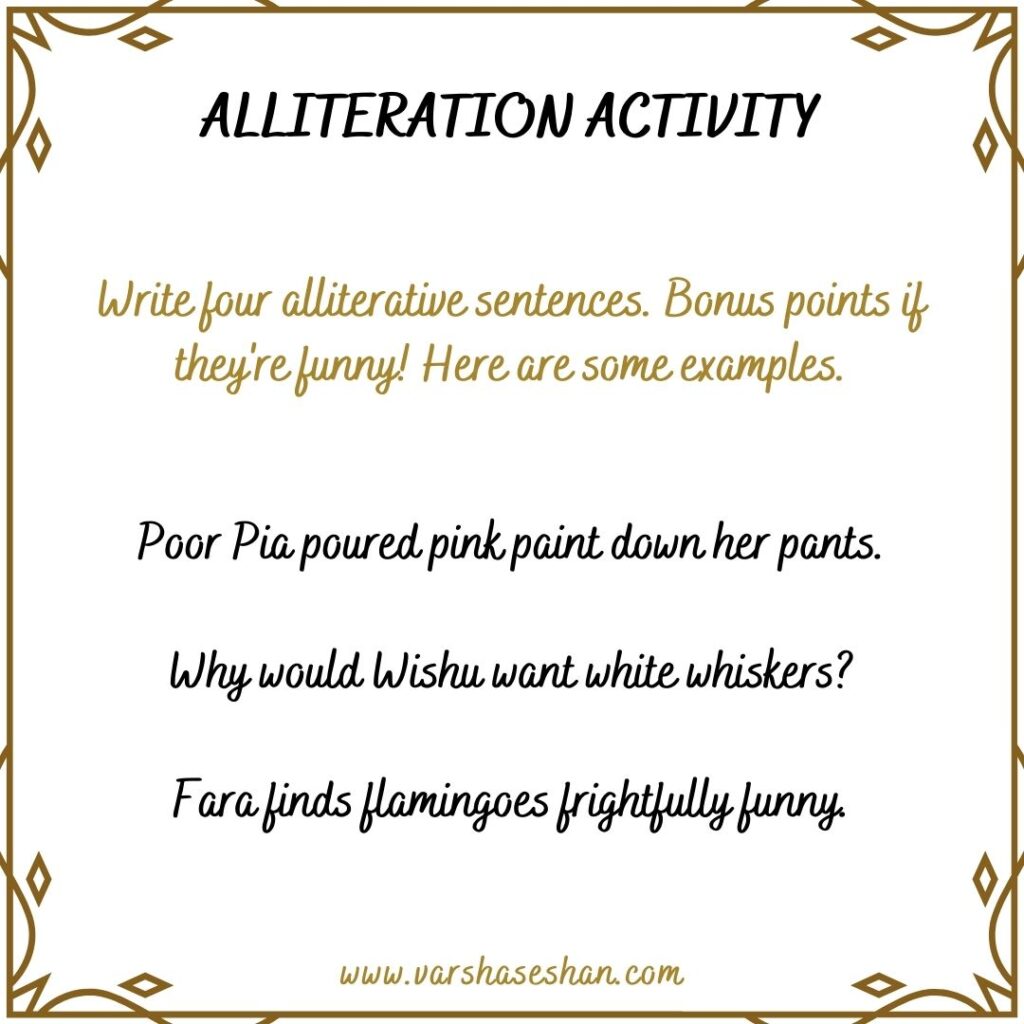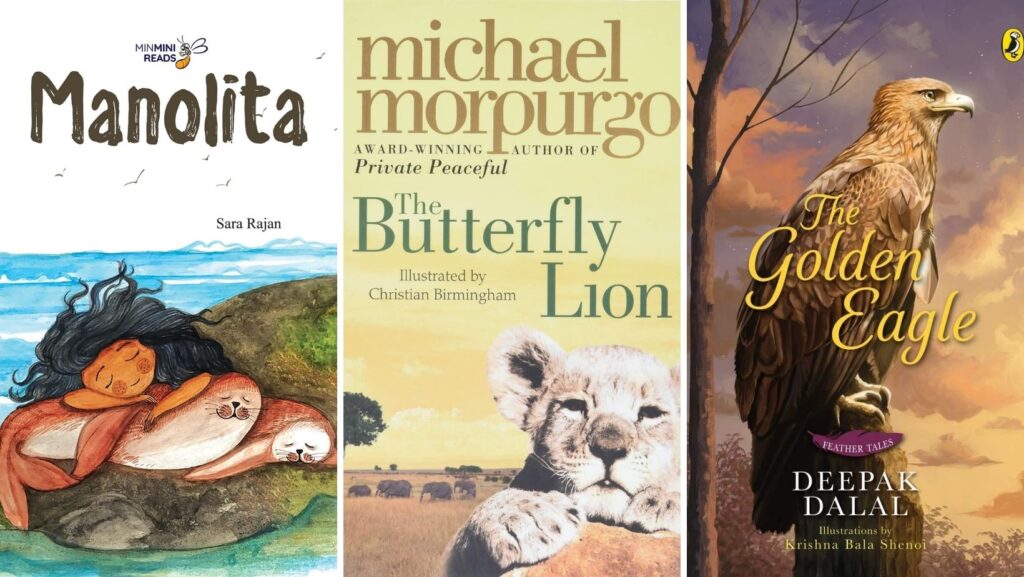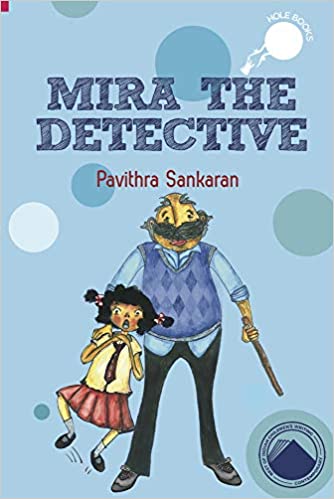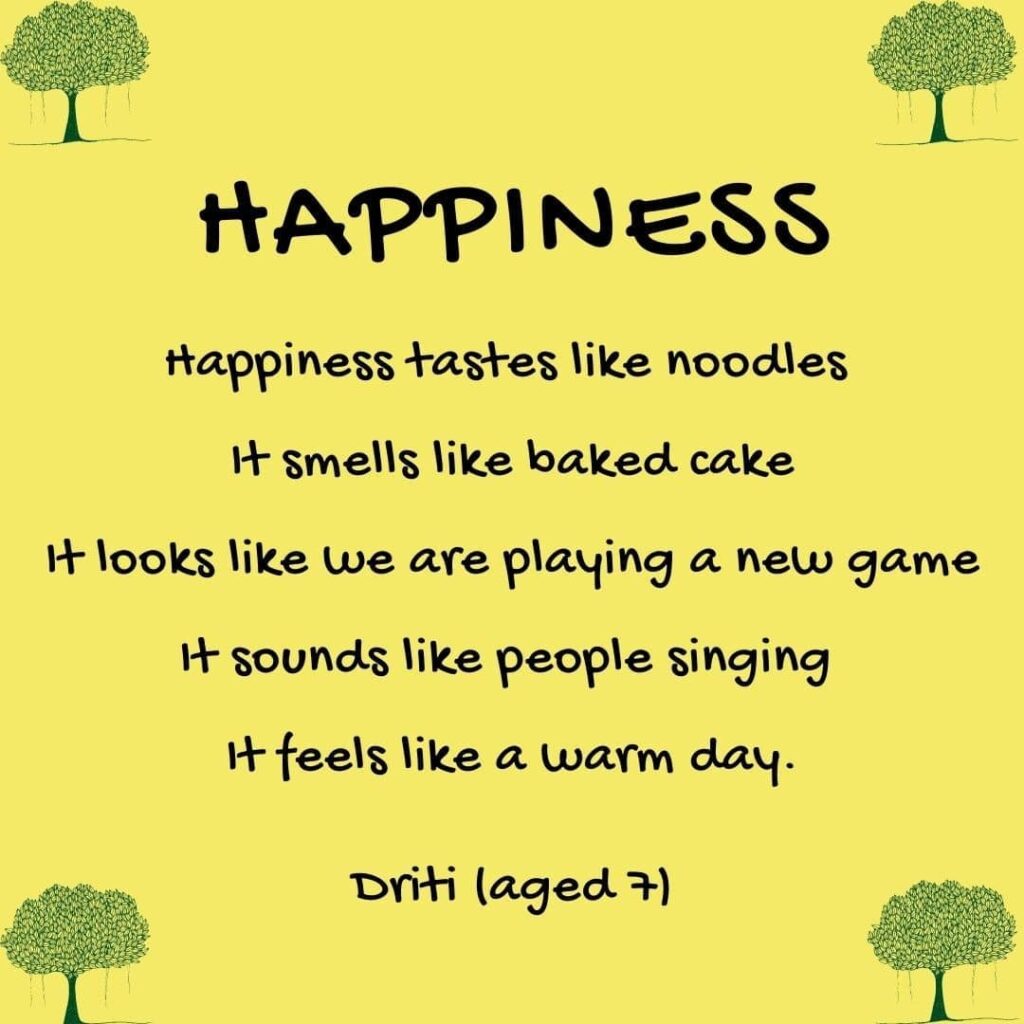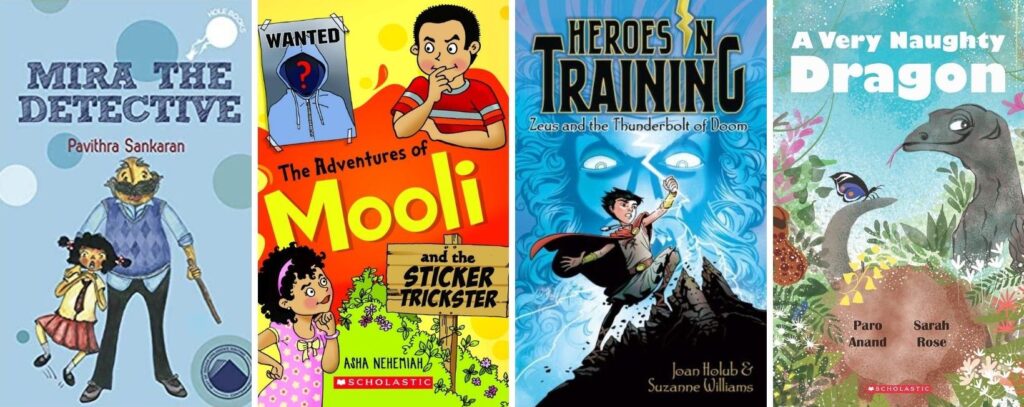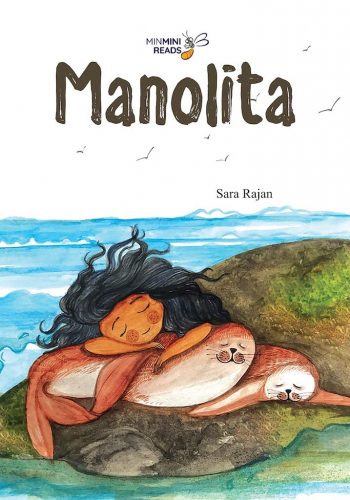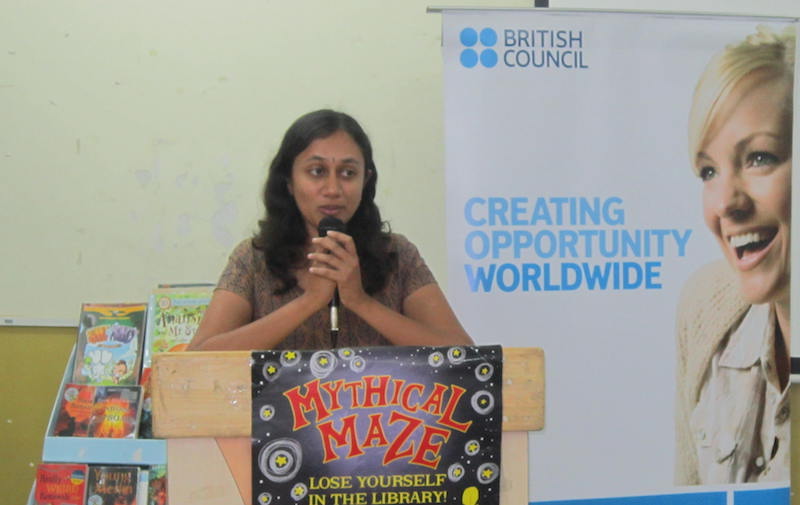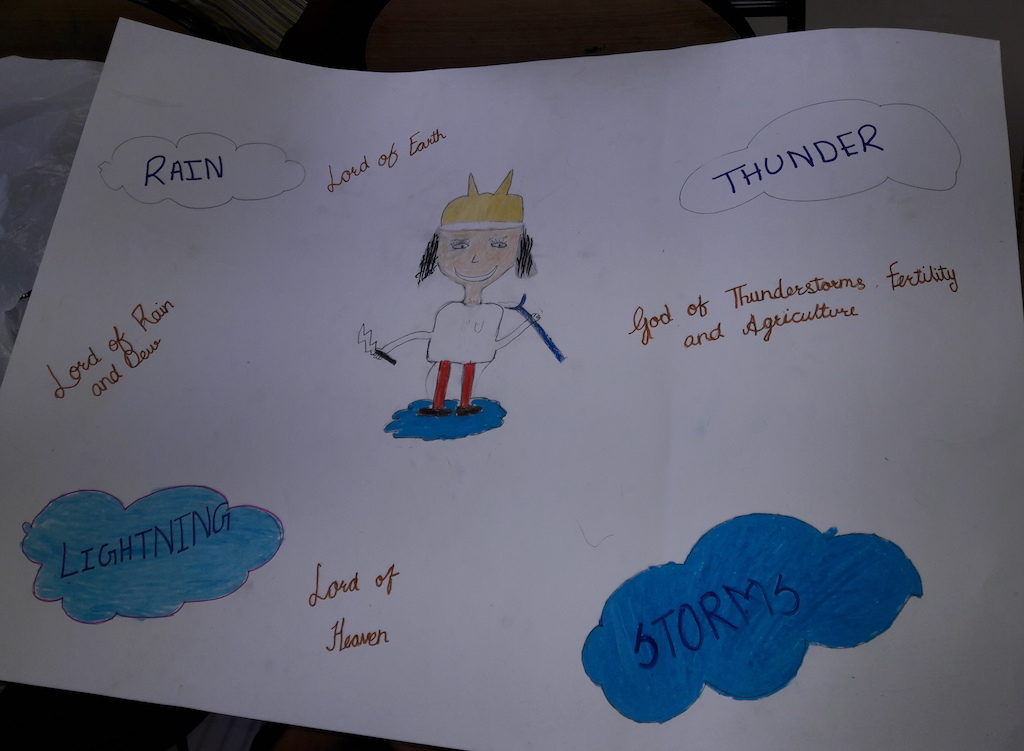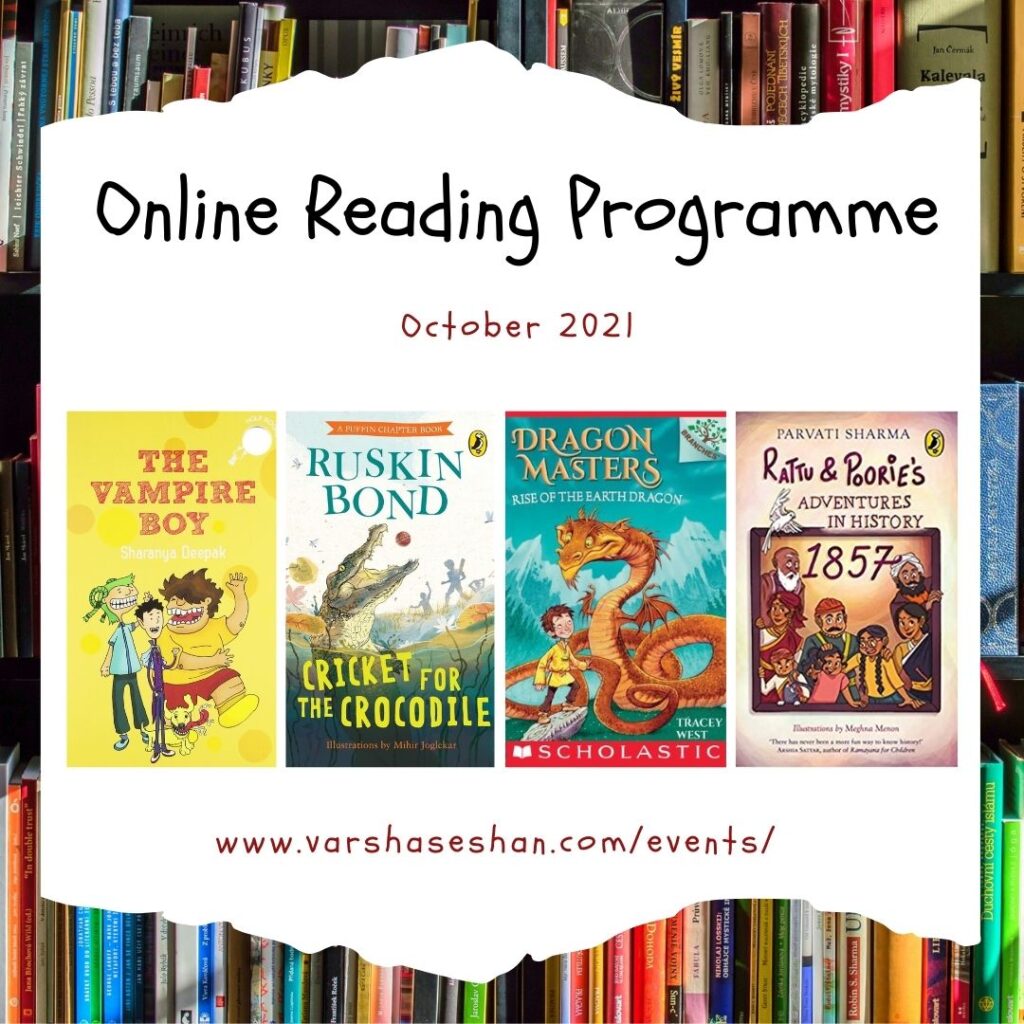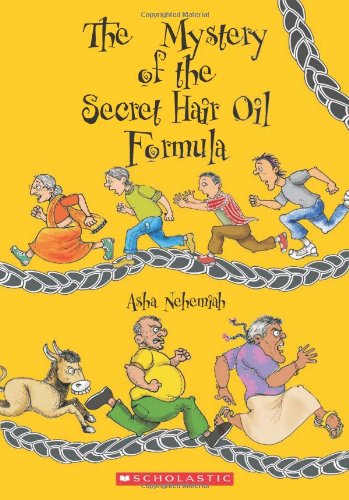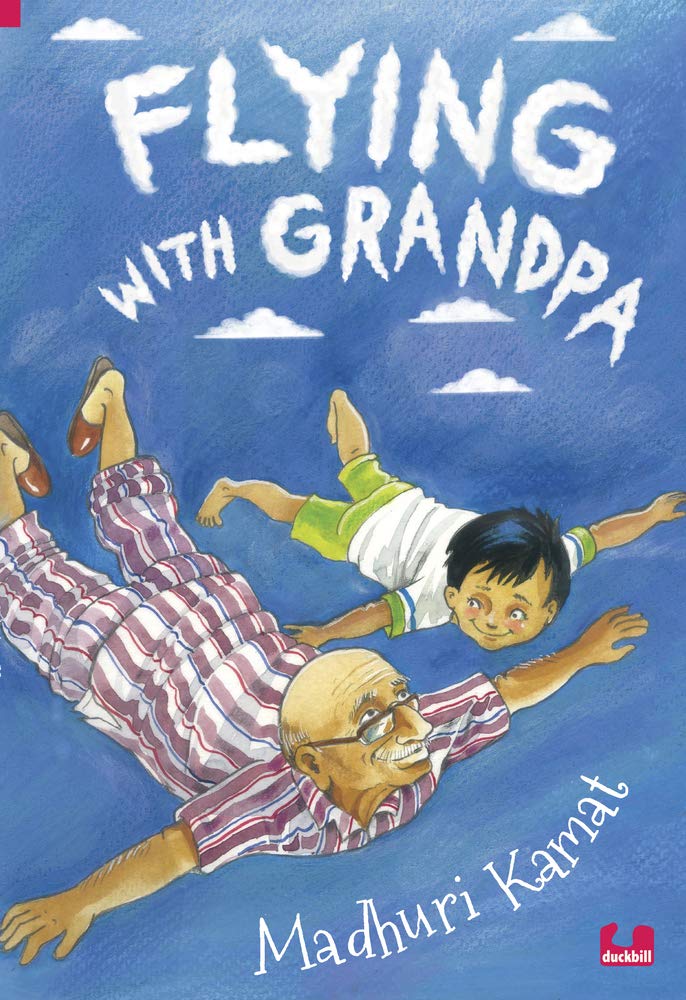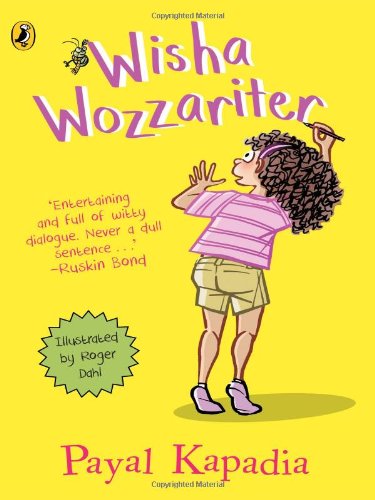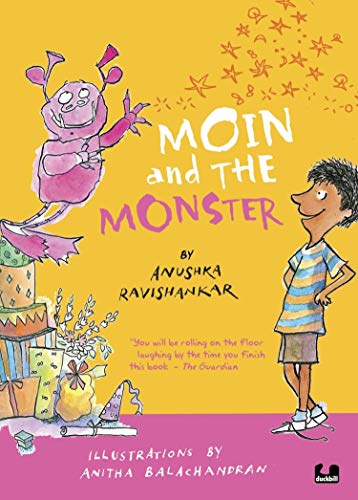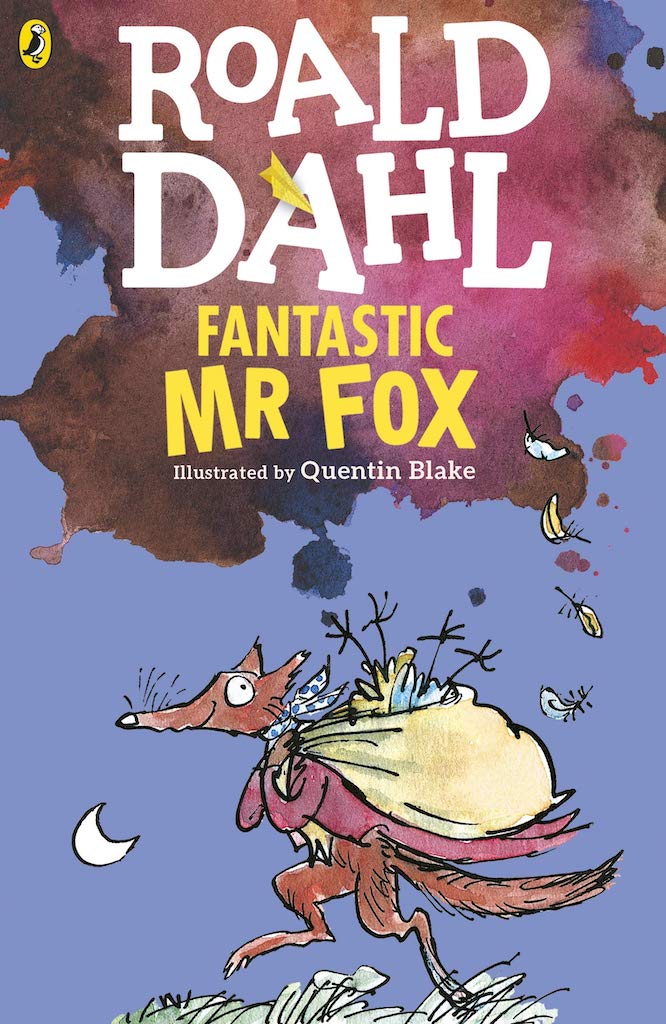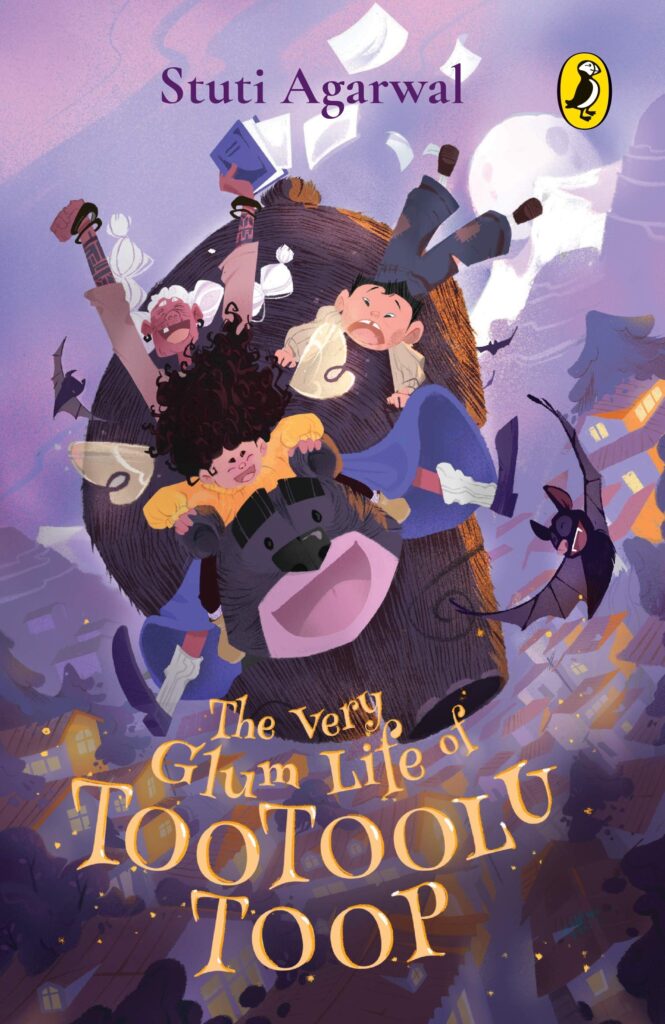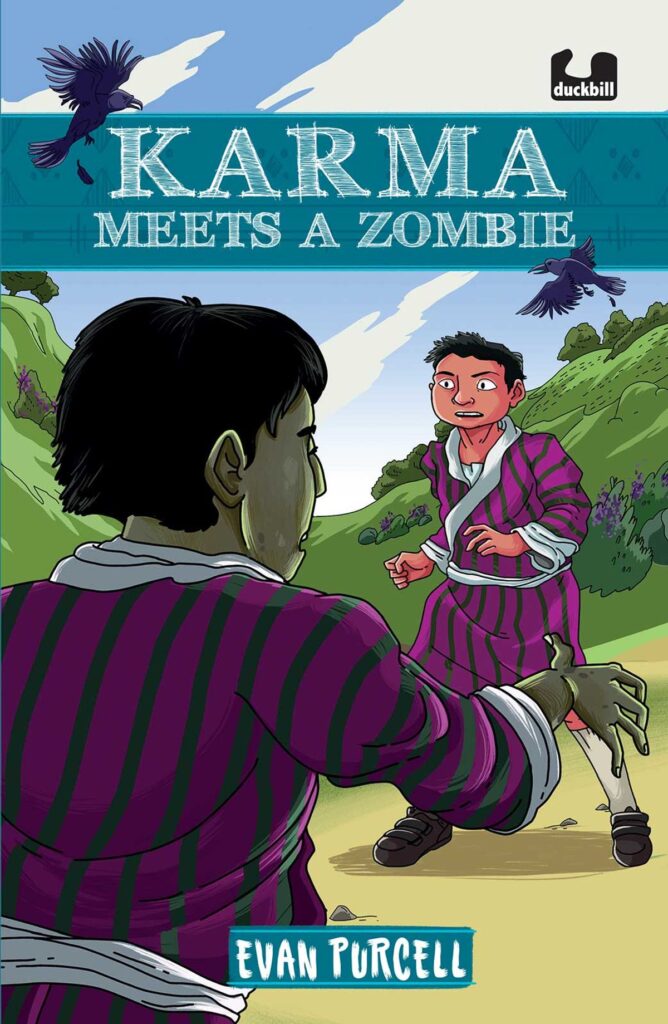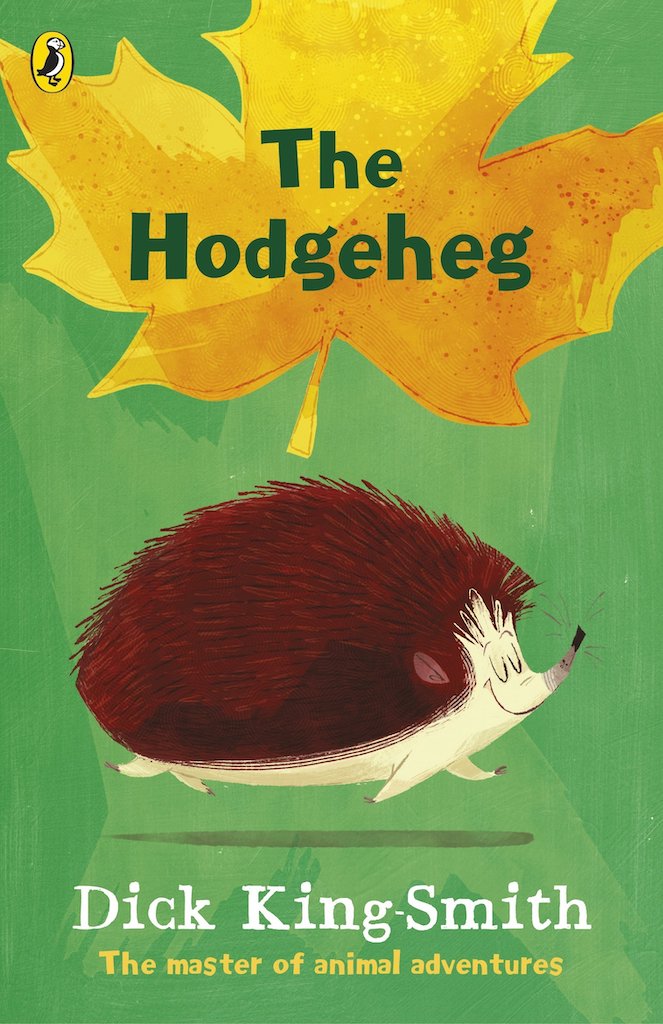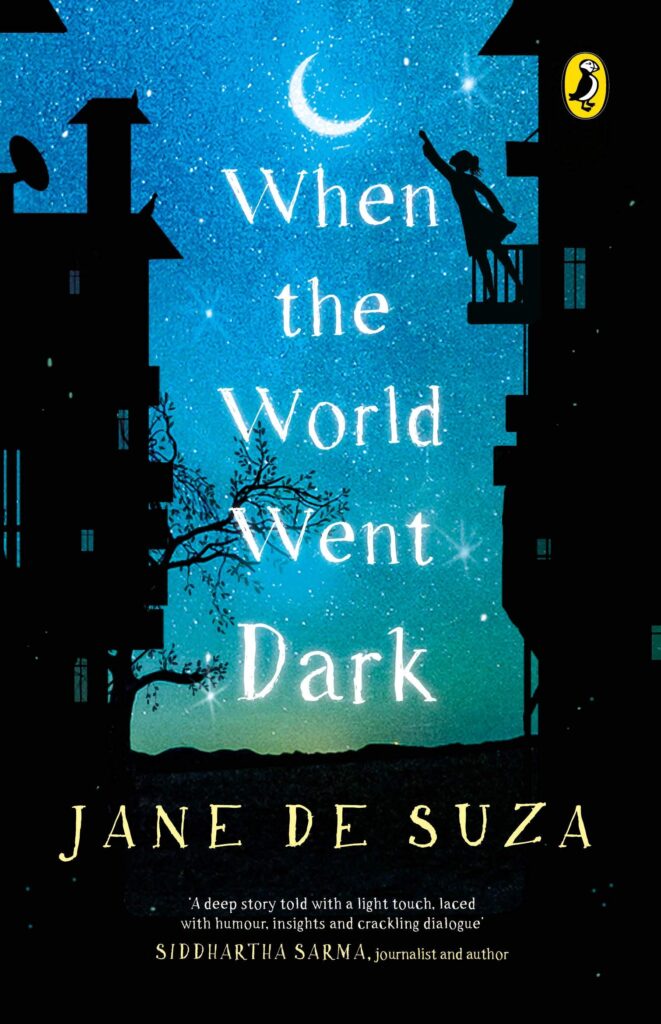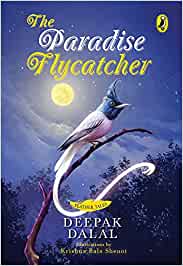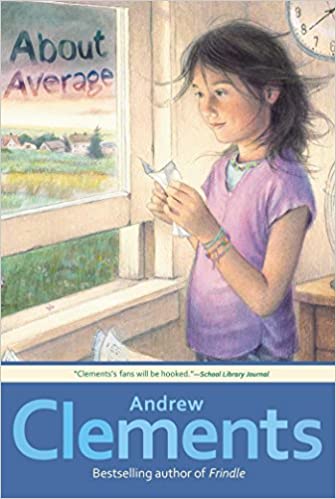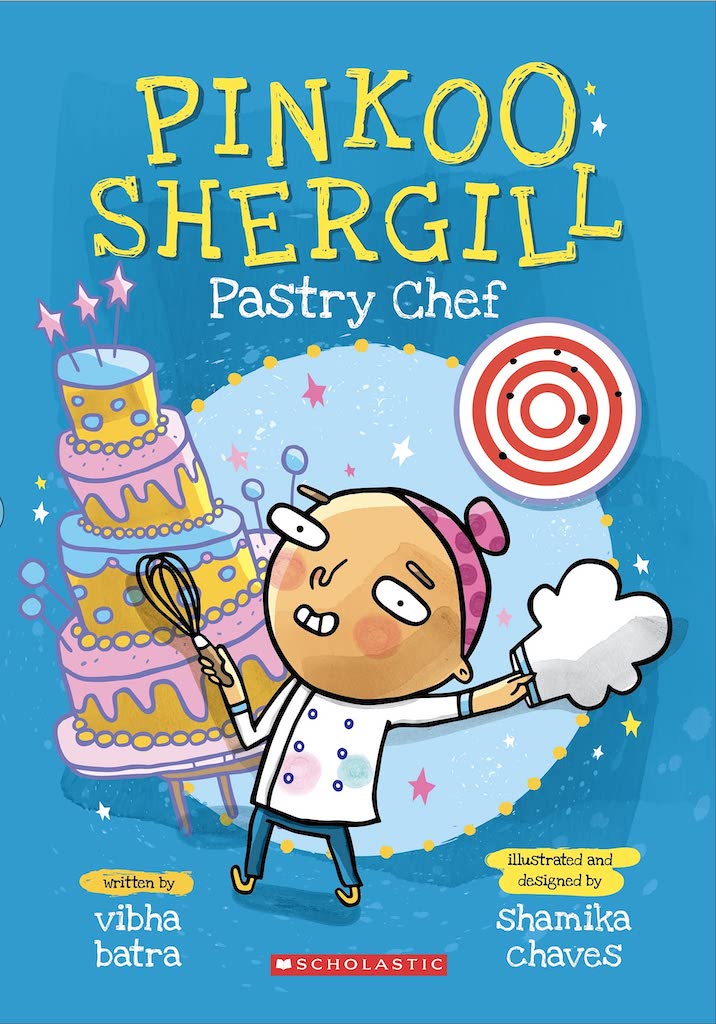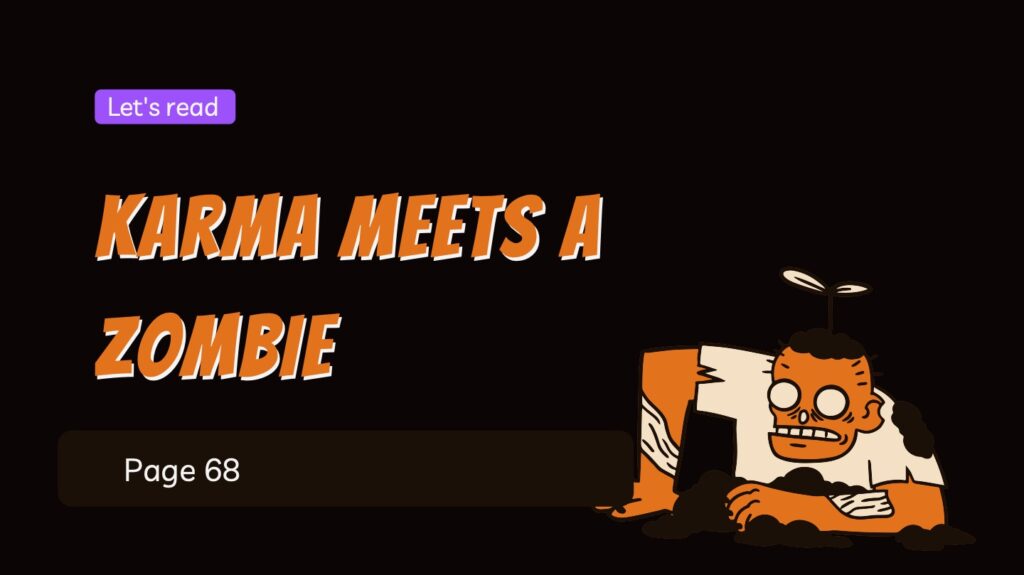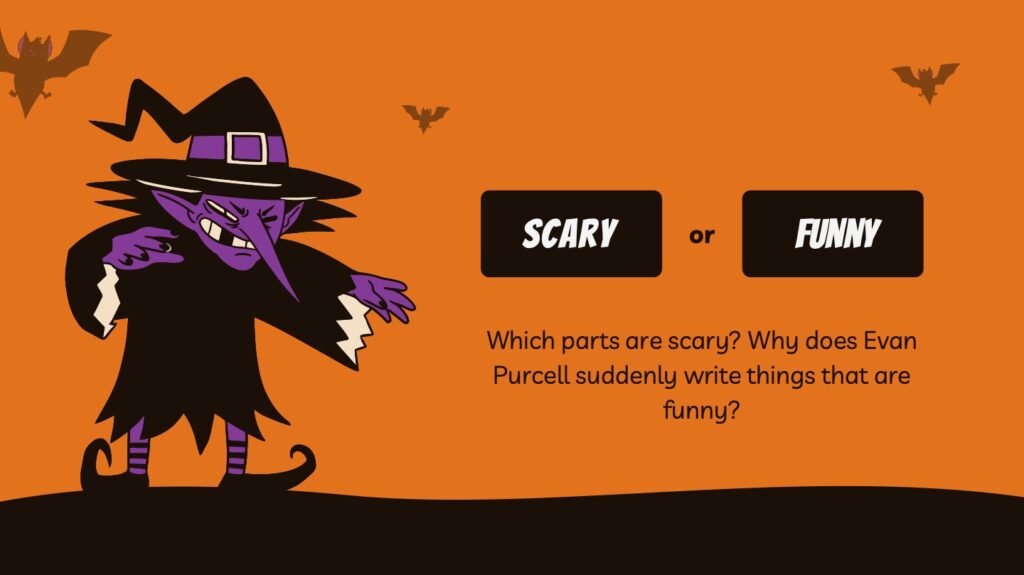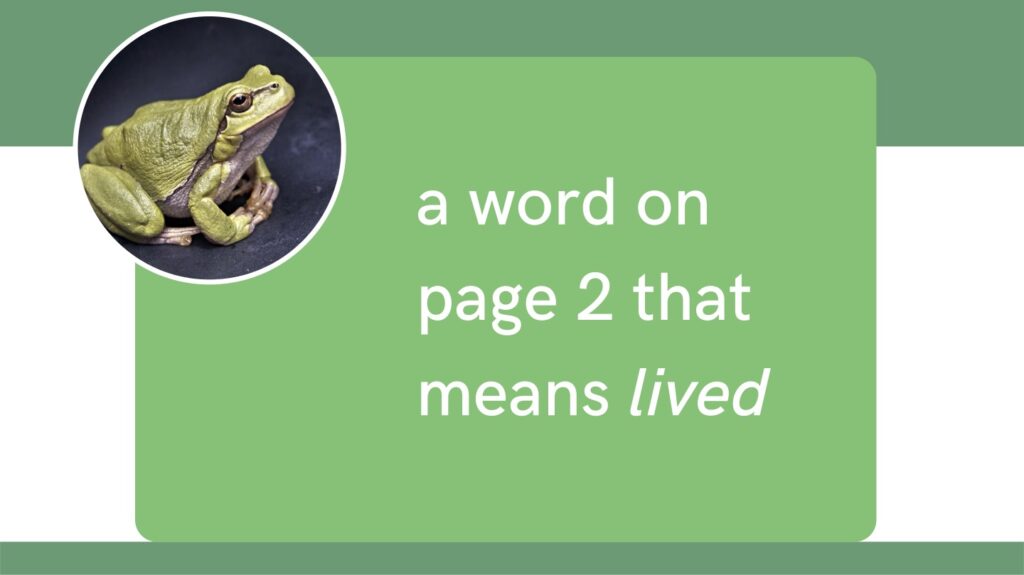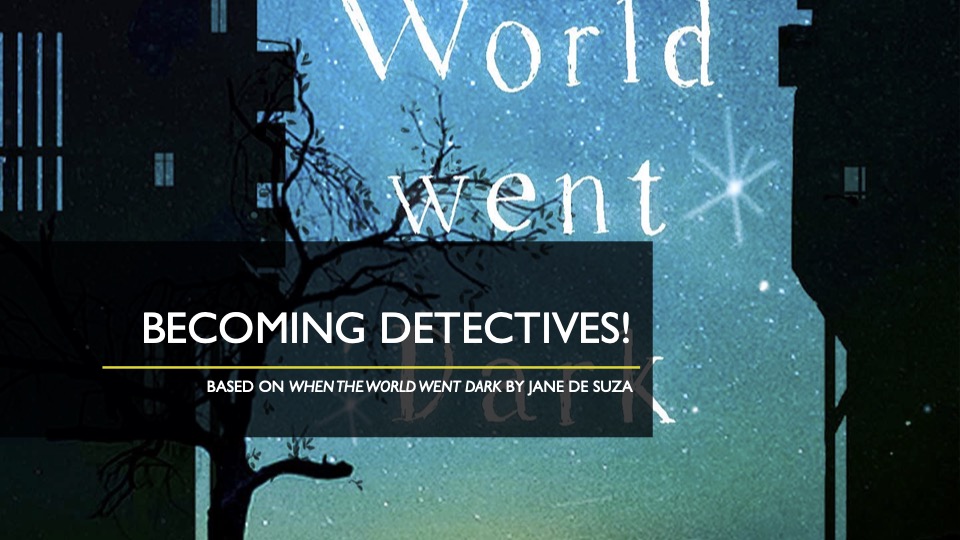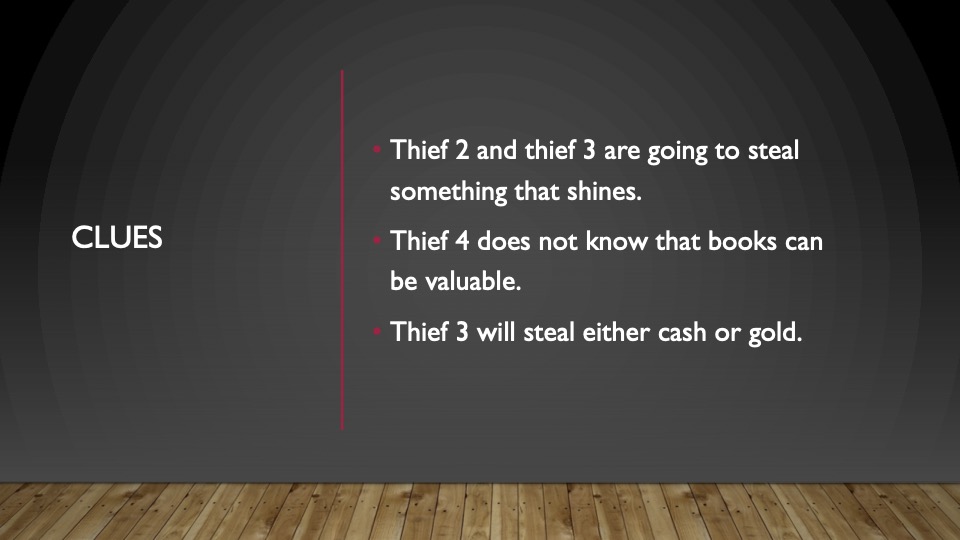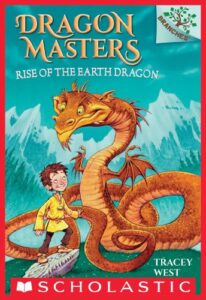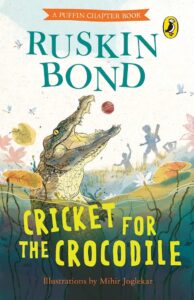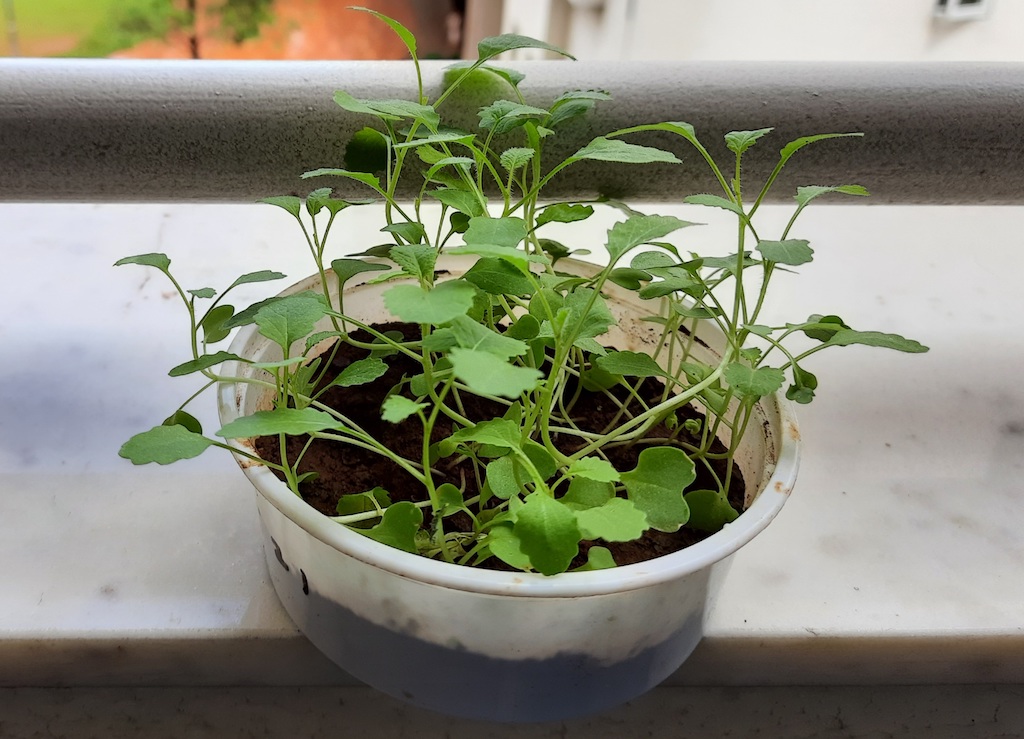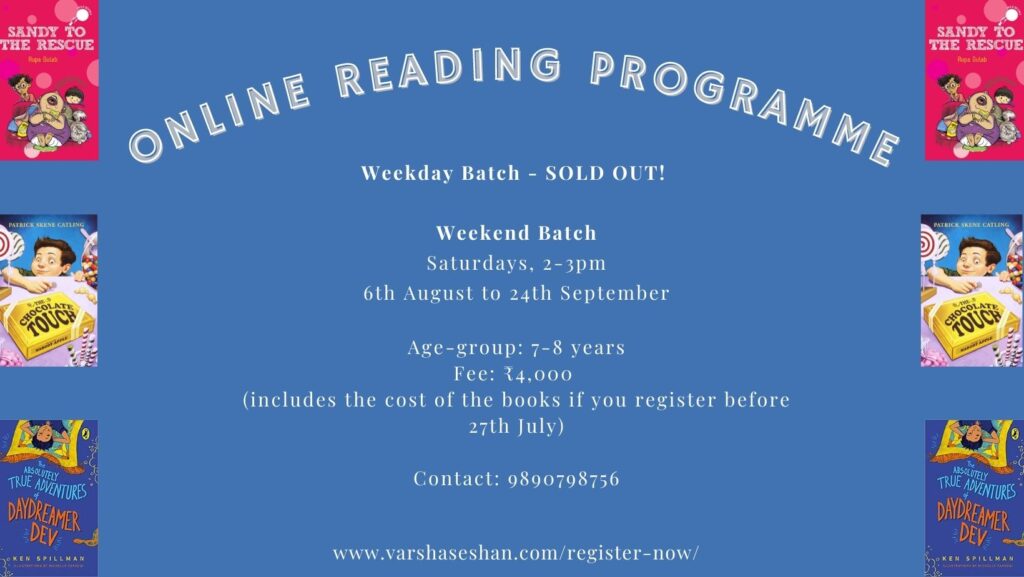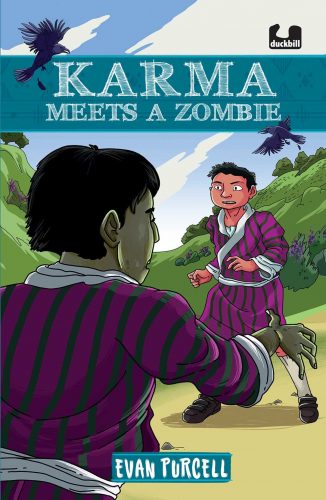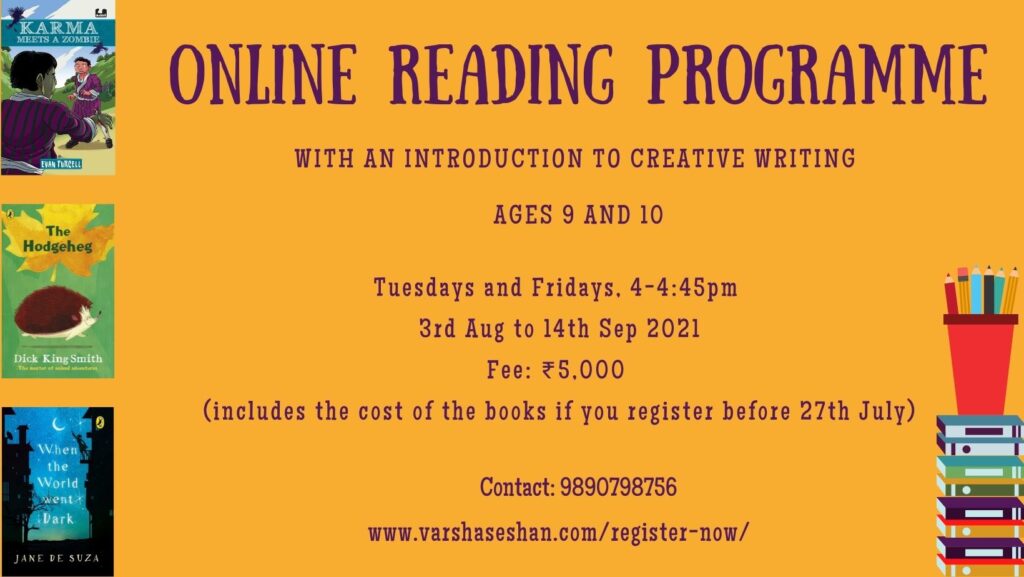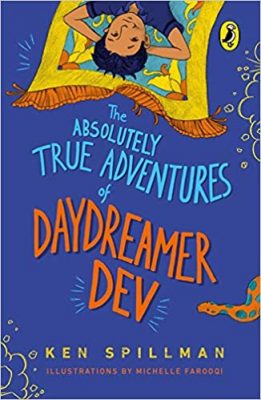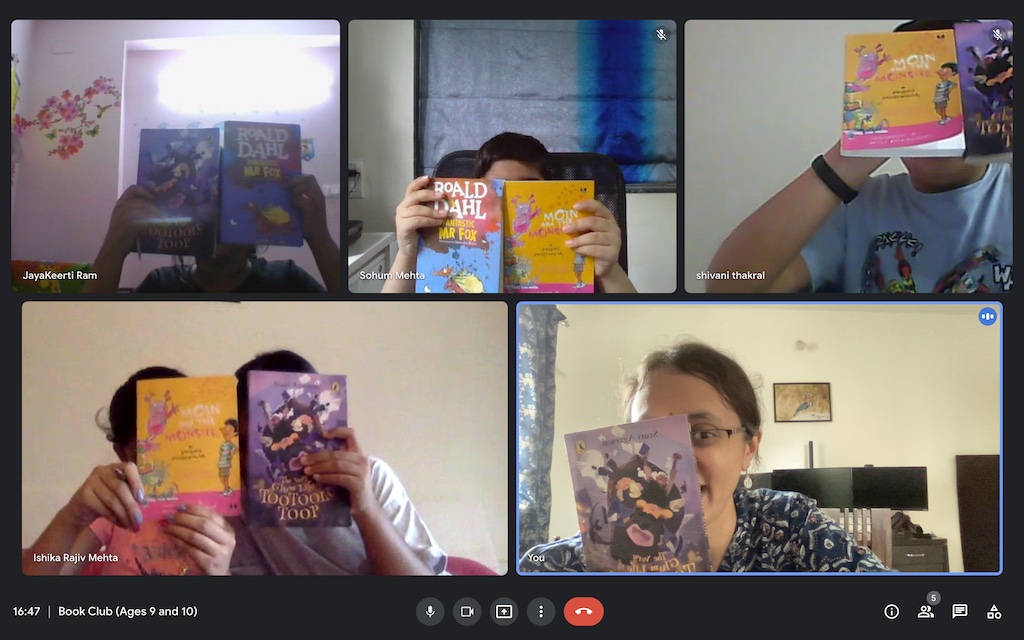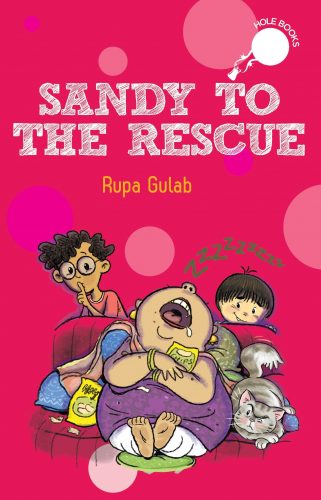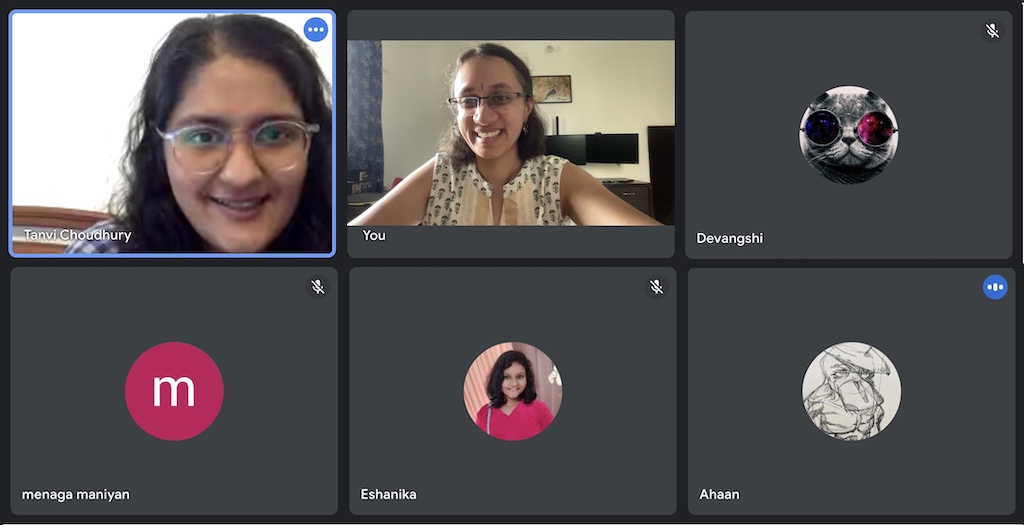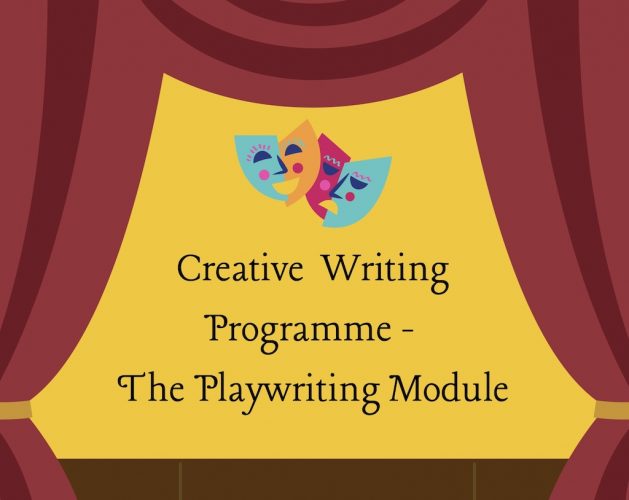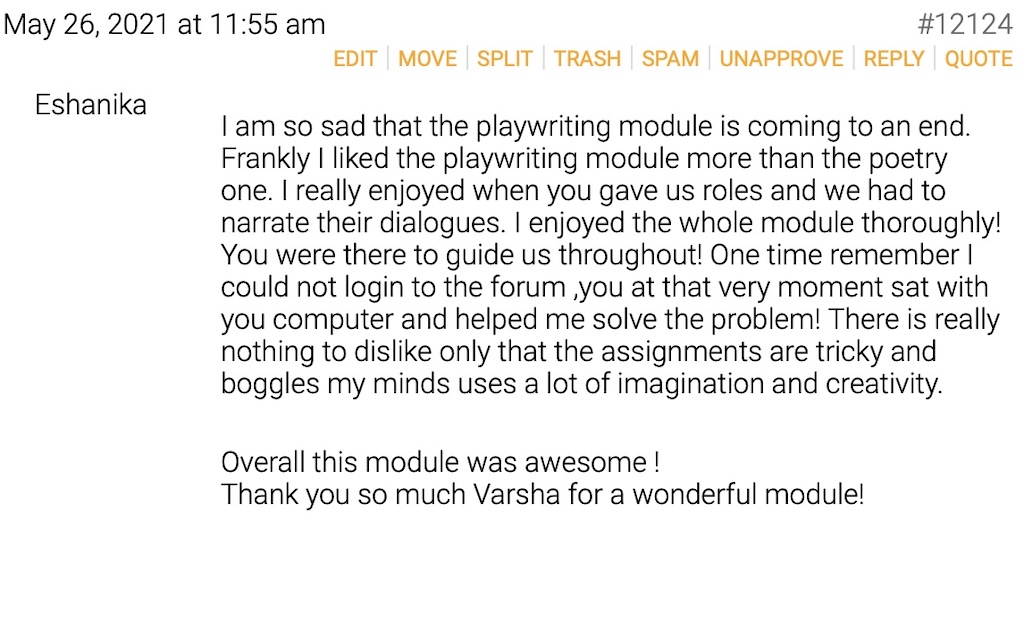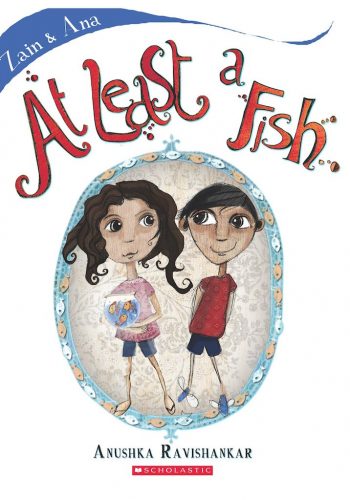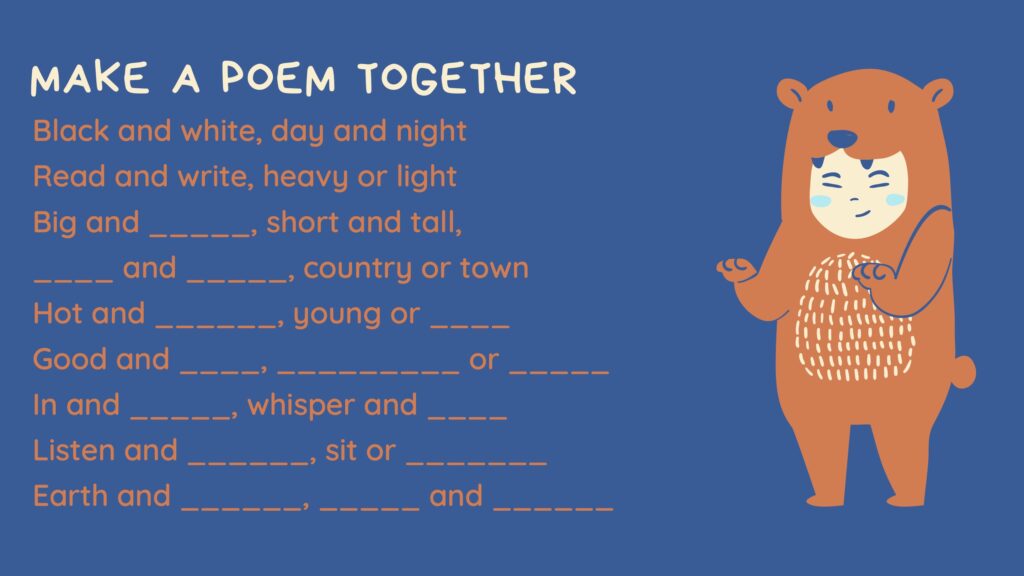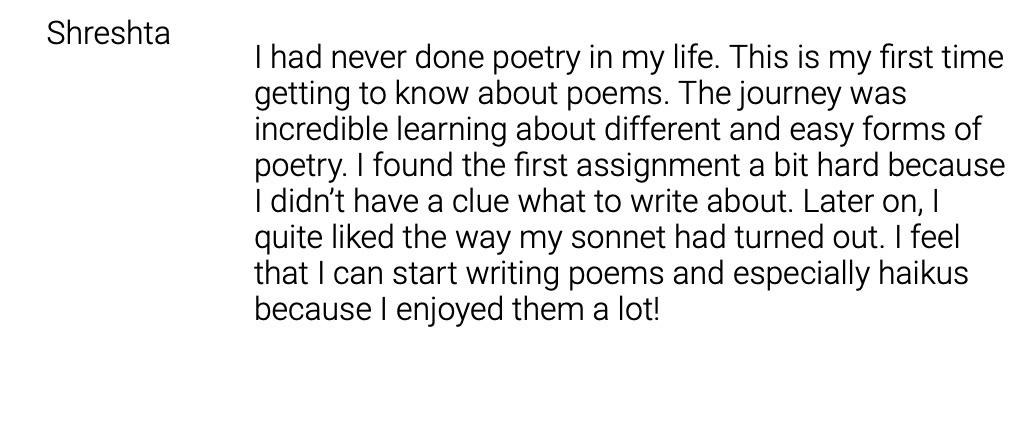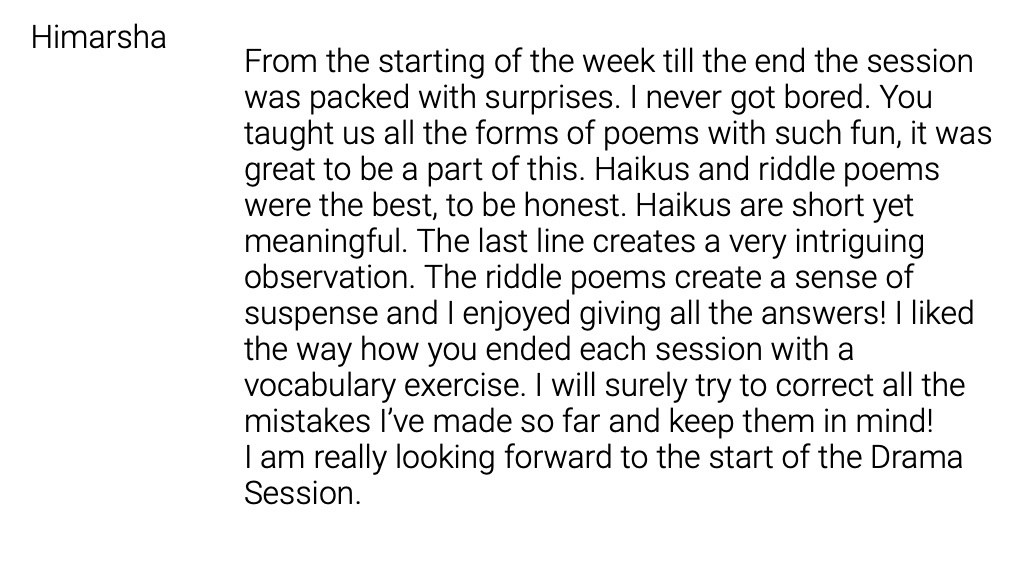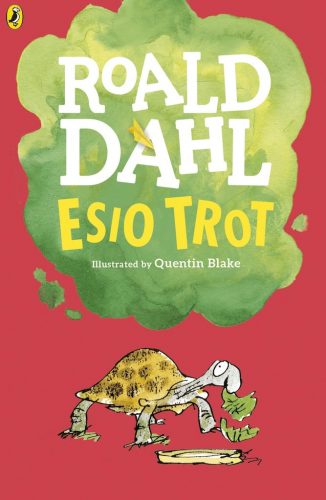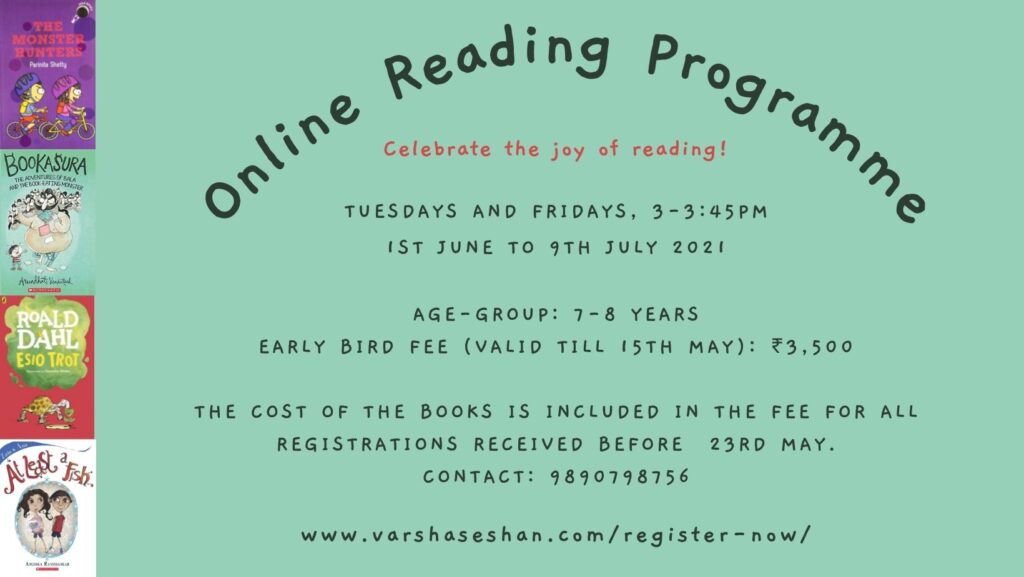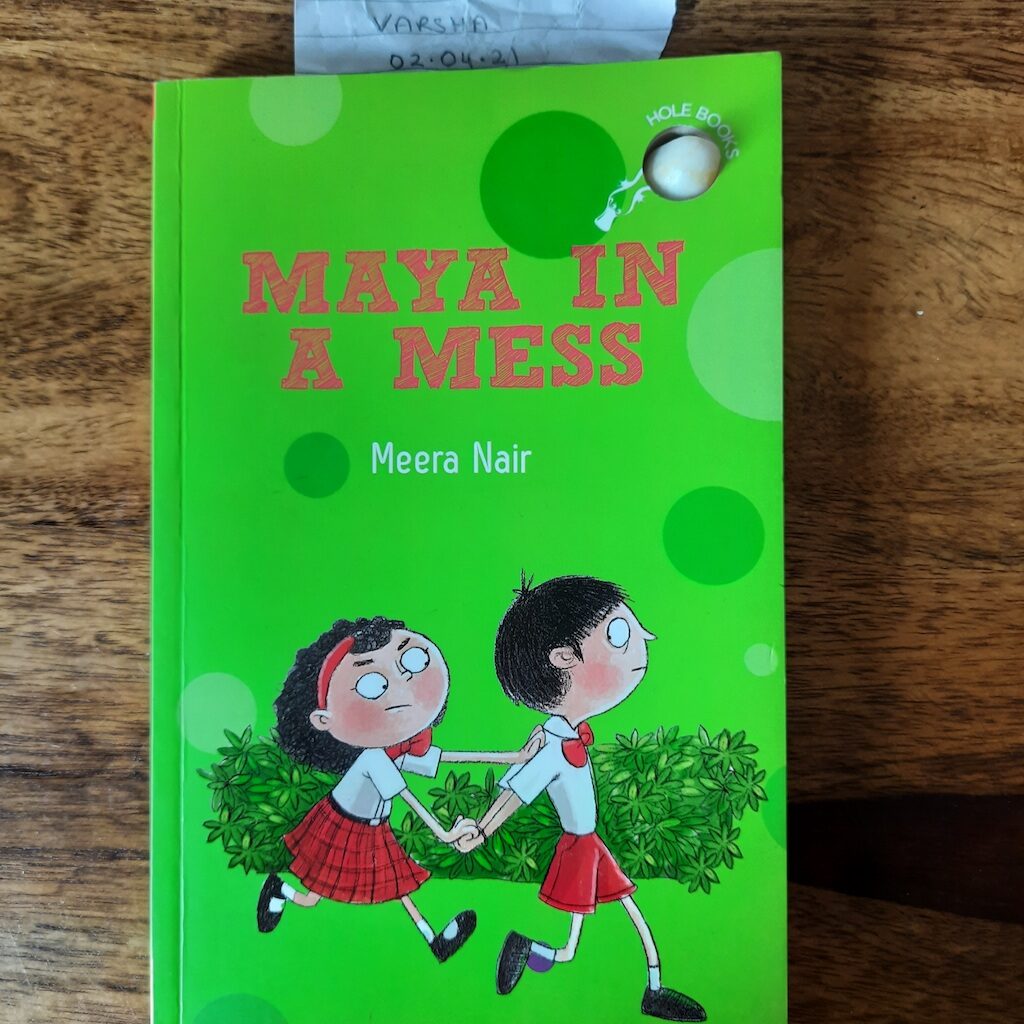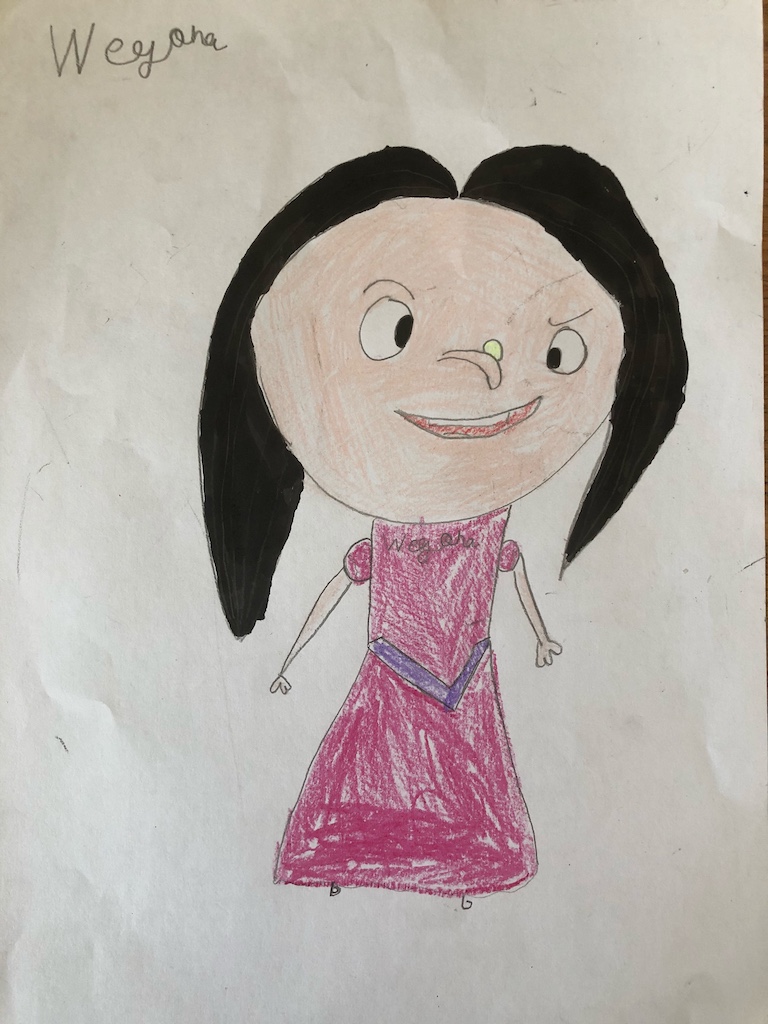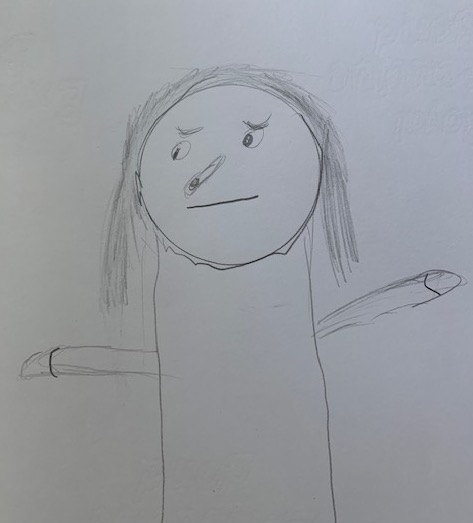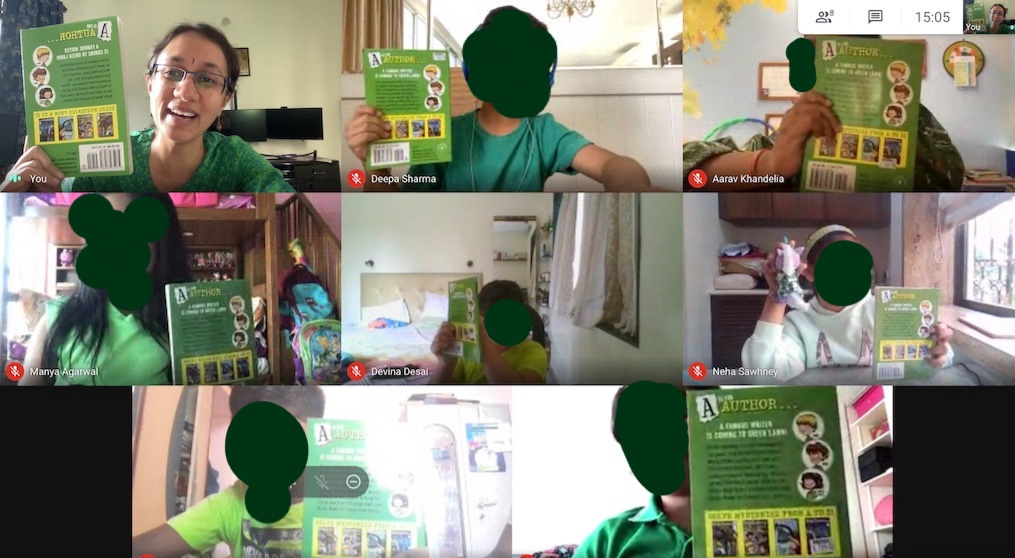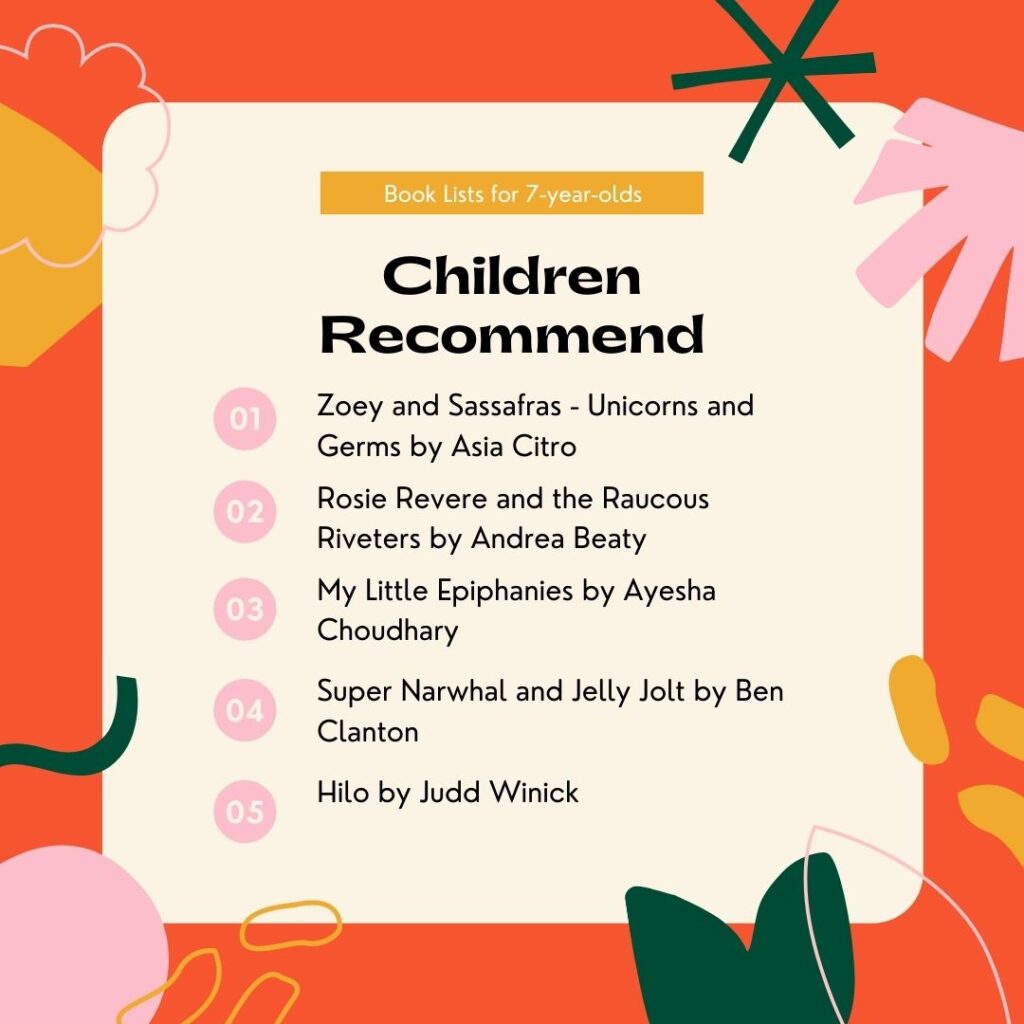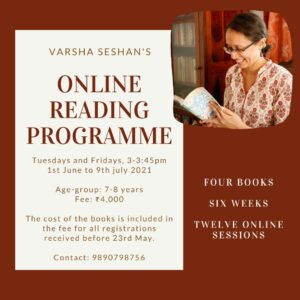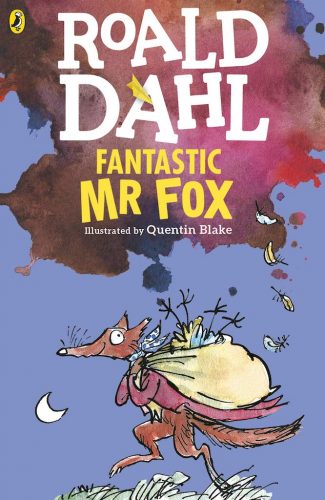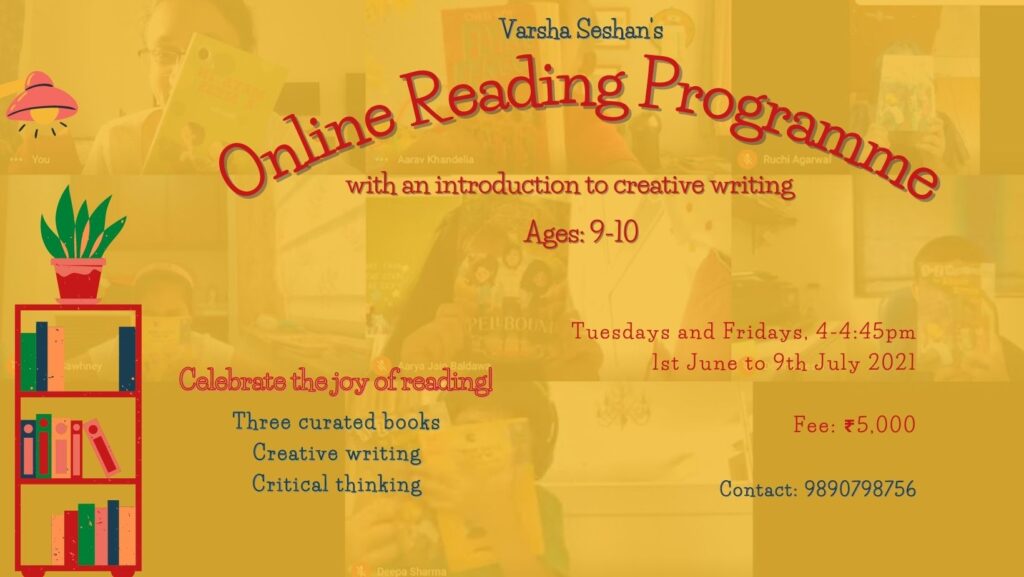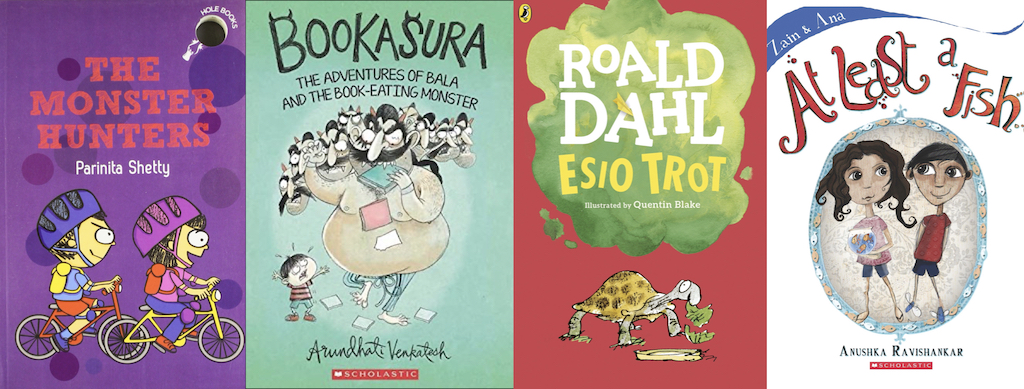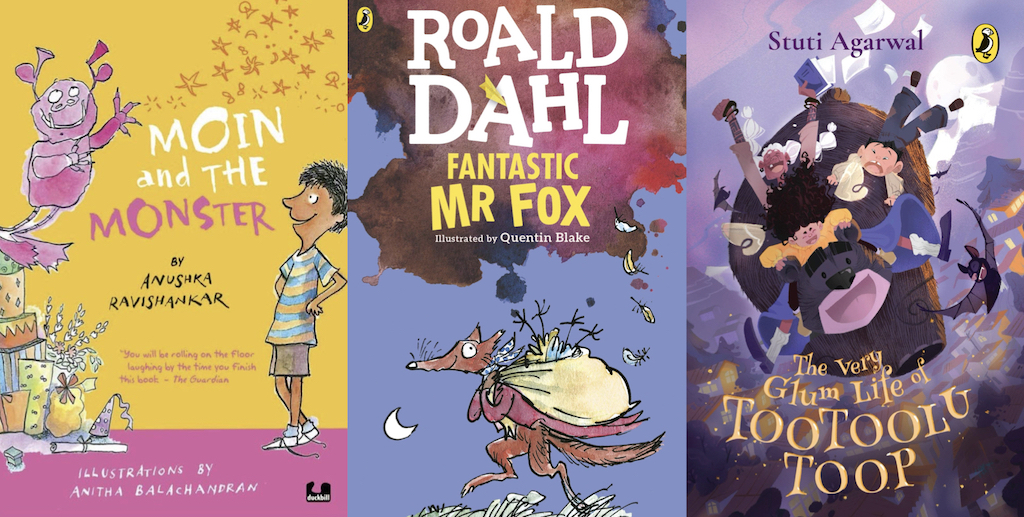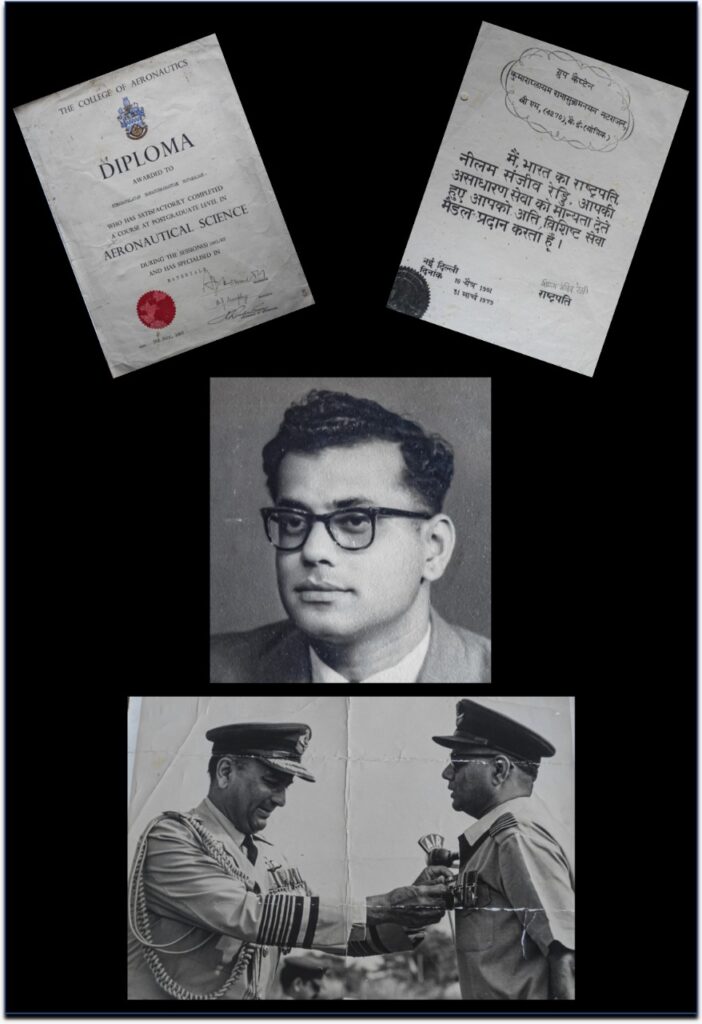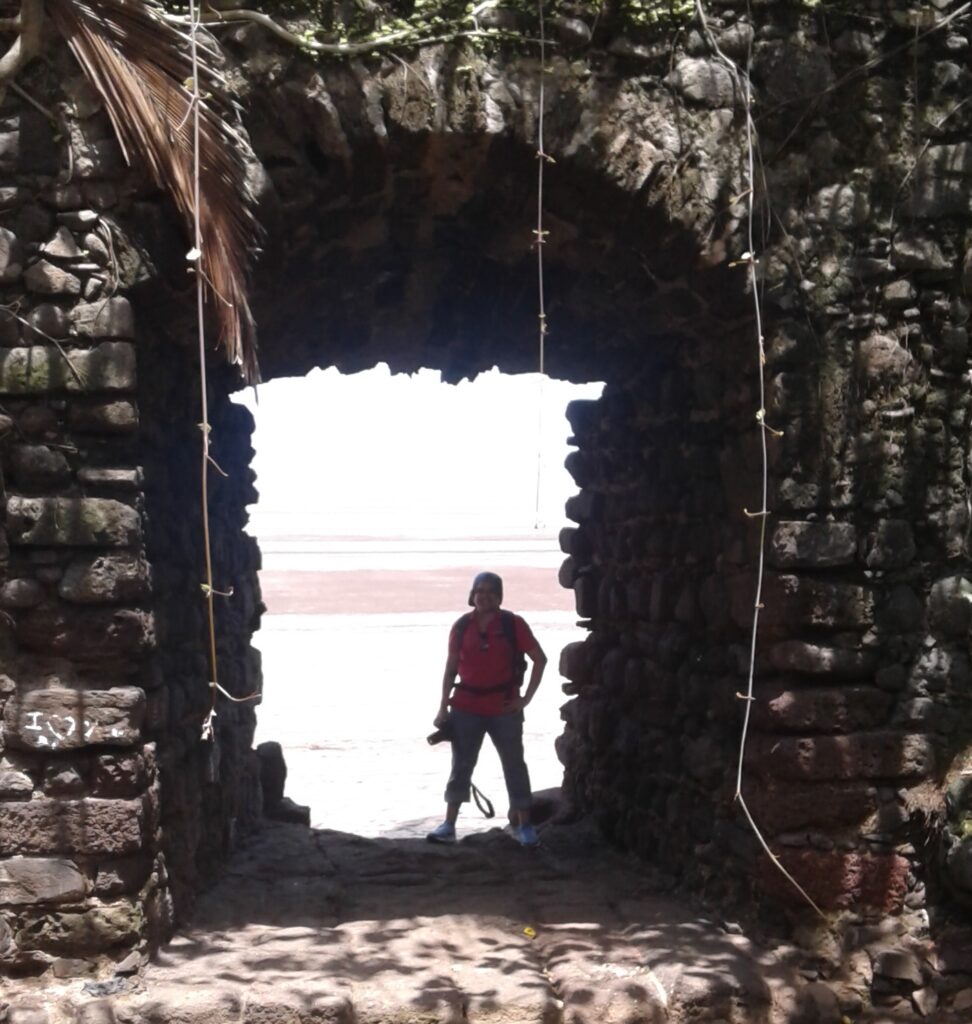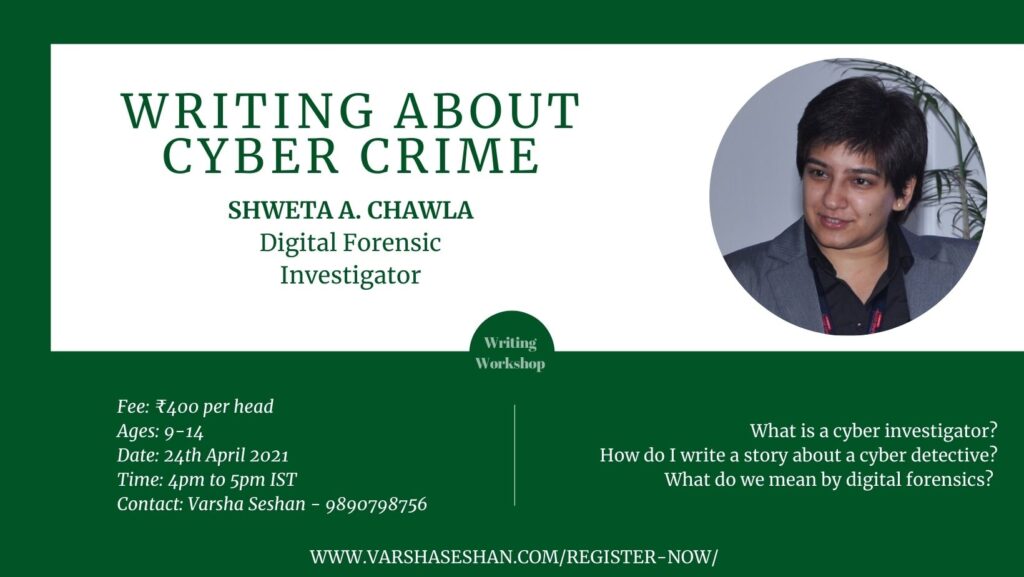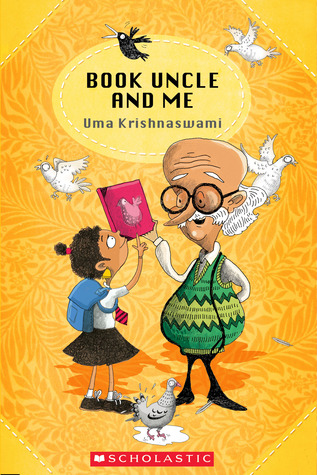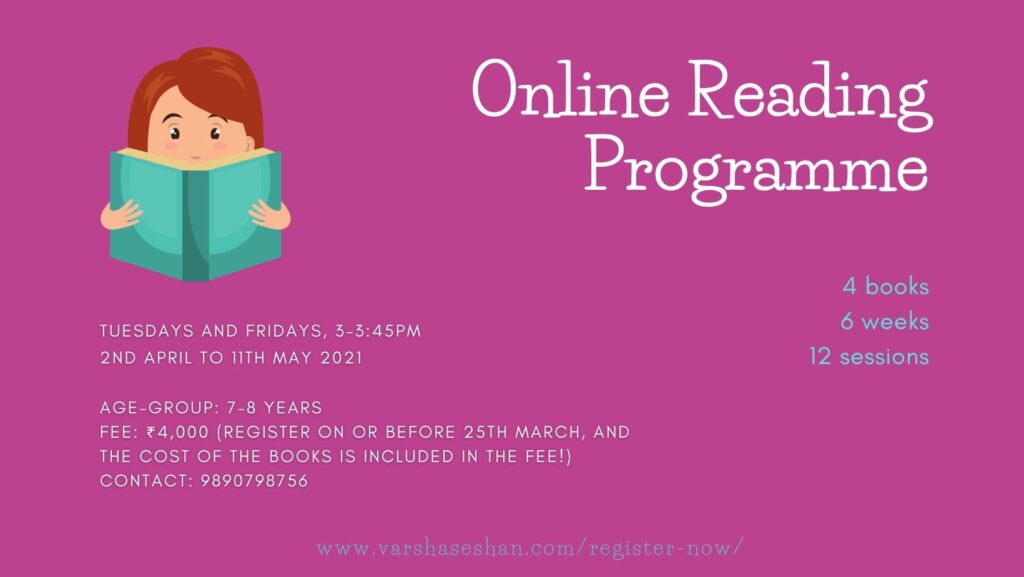The Butterfly Lion
Mira the Detective
Manolita
All About Research with Dr Shayani Bhattacharya
What an enjoyable writing workshop we had yesterday with Dr Shayani Bhattacharya! Every guest session is fun, and I keep realising that when a teacher plans a session, it is meticulous, detailed, excellent!

We discussed what we research, how we research and why we research, but then we went on to something that’s important to all of us as writers – how we share research findings. Sure, you’re fascinated by time travel and wormholes. You read everything you can about them. How can you get your readers to be interested in the same things? When Shayani stressed the idea of finding our unique voice, my heart gave a little leap. It’s so useful when a guest speaker brings up something I’ve addressed time and time again during my writing programmes!
I also loved that Shayani explored the relevance of research in the context of both fiction and nonfiction. Bringing the workshop to travel writing, we spoke of travel literature of all kinds – from travelling through the forest in Little Red Riding Hood to more obvious choices like Around the World in 80 Days and Journey to the Centre of the Earth.
What the participants loved about the workshop was that every aspect of it was interactive. For instance, here’s just one of the four jamboards we created together.

Travelogues, maps, advertisements, travel tourism, travel blogs, journalistic articles … there’s so much we can write if we just research. Shayani left the participants with a writing assignment, and I’m waiting to read what they write! Like one of the participants said in the chatbox after we’d figuratively explored the earth, the solar system and the galaxies beyond ours through travel writing, ‘Thanks a whole universe! It was so cool!’
Four Workshop Anecdotes
So many tiny things happen during workshops! Here’s a quick roundup of things that make me smile.

Whispering
During one of my sessions, a child raised his hand. I quickly summed up what I wanted to say so that I would not lose my chain of thought, and then asked him to speak.
‘Actually, I want to talk to A,’ he said.
Amused, I nodded to him to go ahead.
What he wanted to say to A was utterly and completely unrelated to what we were doing.
And that’s what made me realise – at online classes, whispering has to happen with the teacher’s permission!
I like
The protagonist of The Vampire Boy is Kris, a vampire who hates blood. With that in mind, I asked the children to come up with sentences about themselves, telling us two things: one, something they like that their friends also like, and two, something they like but their friends don’t. My favourites?
My friends like troubling my parents, and I do too!
My friends like jumping on the sofa, and I do too!
And the surprising ones:
My friends like ice-cream and chocolate, but I don’t.
My friends like drawing, but I don’t.
Bringing Things to Life
I also love the spontaneity of workshops! In The Vampire Boy again, Kris’s friend Bo cannot spin on one leg without falling on her face. We read that and instantly, the children got to their feet to try it out.
I can hop in a circle on one leg. Does that count?
Anyone can stand on one leg!
I can spin on one leg!
We read of Kris carrying a bottle of A- blood to school, and the moment I explained what that was, three of the children disappeared. They had to ask their parents – immediately, of course – what their blood group was!
The Chocolate Touch
And then, of course, was this lovely thing I shared on Instagram, but not on my blog.
When we read The Chocolate Touch, I asked children to design their own chocolates, name the company that manufactures it, and add any other details they like.
Here’s what followed!



Rattu & Poorie’s Adventures in History: 1857
Reading, Reading, and Reading Some More
Rise of the Earth Dragon (Dragon Masters #1)
Cricket for the Crocodile
Raise Hand
Children will be mischievous. They will always, always try to find ways to fool their teachers. The most common excuse during virtual sessions?
“I lost connection.”
Much as children like to believe otherwise, teachers can tell when children aren’t attentive. They stare at the screen and their eyes glaze over. At my book club, I know they aren’t reading along. For one, they shouldn’t be looking at the screen at all. If they’re gazing at the screen, they’re doing something else. Of course.

But when I ask them a question linked to what we’re reading, pat comes the response, “Sorry, I lost my connection. I don’t know where we are.”
So, yesterday, I told the children, very casually, to raise their hands immediately if they lose track. “Don’t wait until I ask you to read. If you lose your connection and can’t find where we are, raise your hand!”
I could see the bewilderment. A new plan was needed, and fast!
“But on my screen … I don’t have … There’s no ‘raise hand’ button on Meet!”
“Your real hand,” I said. “Just put your real hand up.”
The idea was clearly new to the child.
My real hand? Really?
Ah, virtual world problems.
Book Club Discussions
We just finished reading Sandy to the Rescue, the first of five books we’ll be reading at this edition of my book club. One of the joys of reading the hOle books at the reading programme is that the length is perfect. We have enough time to read and do activities during each session, which, for me, is what a book club is about.
In Sandy to the Rescue, six-year-old Aftab hides first under the dining table and then in the bath tub.
This made me ask the children, “Where would you hide? If you had to smuggle a friend into your house, what would be a hiding place?”
We discussed the storage cupboard, a balcony with newspapers (ideal for a little cushioning) and under the bed. I then led them to another activity – finding a hiding place for something a little smaller, like a secret note, perhaps. What could they write in the note? That led me to an unexpected discussion because one of the things I told them they could write about was what they’re afraid of.

“I’m afraid of God,” said one child.
I could see that this was a new thought for several of the others because they were thinking of other things that, maybe, they thought were more trivial.
Even so, one child said, “I’m afraid of dogs. I don’t like it when they come close.”
Unexpectedly, a child piped up, “Oh, I’m more afraid of zebras! Dogs are nice. Zebras are frightening.”
Before I had the time to process this, a fourth child said, “I’m afraid of cancer. It is the scariest thing in the world.”
Somehow, the conversation around cancer continued, with one child saying that cancer has a cure, so she’s not afraid of it.
“But cancer kills people!”
“But it doesn’t have to. You can fight it. Anyone can fight cancer.”
“No, it is frightening, and–“
The conversation went on until one child asked, “Could we stop talking about cancer?”
And we did. But that didn’t stop me from thinking about it.
Immediately, another child said, “I’m afraid of floods. Floods are the scariest of all.”
And that’s a thought that hadn’t struck me. Why is she afraid of floods? I asked her if she had ever seen a flood and she shook her head. But what causes that fear?
After the session was over, I began to think about what scared me as a child and what scares me now. Are we so frank about what really frightens us?
My June Reading Programmes – An Overview
Karma Meets a Zombie
The Absolutely True Adventures of Daydreamer Dev
Another Reading Programme Comes to an End!
Sandy to the Rescue
The ART of Stories
Pirates, Legends, and Historical Fiction
Yesterday’s guest session was full of stories! While we are familiar with Long John Silver and Davy Jones’s locker, how many of us are equally familiar with Kanhoji Angre and the pirates of the Malabar?
We began with a discussion of myths, legends, and historical fiction, and this, I think, is an important idea that is well worth repeating. A myth is not history or historical fiction. It is a story created by human beings in an attempt to make sense of the world. Even if a myth helps us understand something about the time when it was created, it isn’t a true tale.

A legend is not true either! My mother, Dr Radhika Seshan, told us the story of the emperor Jahangir and his bells of justice. Legend says that a donkey rang one of the bells one day, and Jahangir proclaimed that a donkey deserves justice too. Is the story true? We have no idea, but legends are often built around people who slowly, through stories, emerge as beings larger than life.
What, then, is historical fiction?
Historical fiction has a very sound foundation in fact, based on evidence. This is what makes it difficult to write. If we write about Kanhoji Angre or Ram Koli, we need to understand their times and set our stories accordingly. We need to know about the boats they used and where they lived. We cannot make them use Mediterranean ships! We also cannot change the course of history.
What, then, can we, as writers, imagine? We can imagine their conversations. We can imagine what went on in their heads. Kanhoji Angre was clearly a strategist. How would he have planned his course of action? Would he have been afraid the night before an attack? Or excited? The emotional and mental aspects are ours to play with.
I’ve given the children who attended the workshop a couple of writing assignments based on yesterday’s session. I can’t wait to read them; I’m sure they’ll be fun!
Mark your calendars – the next workshop is on illustration and will be conducted on the 19th of June! More details as soon as I open for registration.
The Playwriting Module – Reflections and Resources
At Least a Fish
Creative Writing Workshops – Reflections and Resources
Esio Trot
Looking Back at Another Reading Programme
Fantastic Mr Fox
Workshops Launching in May and June 2021
Writing about Cyber Crime
What a fun session we had with digital forensic investigator Shweta A. Chawla yesterday! The children had all kinds of questions, and all kinds of stories. Nearly every child had a story of a parent or relative receiving a call and asking for an OTP or bank details. It just shows you how close cyber crime is to us!
One child said, “We should keep changing our passwords, but it’s difficult to remember them. So I write them in an Excel sheet.” Before Shweta could respond, he said, “The Excel sheet is password protected.”
And I found myself thinking, Do I even know how to create a password-protected Excel sheet?
We spoke of how stories no longer need masked robbers going into banks with guns, and the fact that you are much more likely to encounter a hacker online than a smuggler. Sure, we love our Enid Blyton stories of smuggling and crime, but perhaps stories can reflect something much more accessible – a criminal working from home, just like the rest of us.
Finally, if we create a character who is a digital investigator, what would that investigator’s line of thought be? What questions does the investigator ask to start tracing the criminal?
Character motivations, procedures, forensics, passwords – we learned so much during the session!

This was just the first of three sessions planned for this writing programme. Mark your calendars for the next one, which will be on the last Saturday of May. Registrations will open shortly, but here’s a teaser – we’ll be talking about pirates during this one!
Books and Important Conversations
Writing about Cyber Crime
Workshops During a Pandemic

Last week, I started reading Maya in a Mess with my book club for seven and eight-year-olds. As part of the discussion, I asked them, “Have you ever been a monitor in class? How do you feel?”
“I feel like a king!” said one child.
“I love it,” said another. “You don’t have to just stand in line with the others. You can actually do things.”
“It feels good,” said a third. “You feel responsible.”
One avid reader in the batch isn’t seven yet, but she’s at par with the others. When it was her turn, she said, “I haven’t ever been a monitor.”
“Do you want to be a monitor?” I asked.
There was a minuscule pause.
“I don’t know. I’ve never been to proper school. When I was in kindergarten, we didn’t have monitors. Last year, it was all online. So I don’t know what it would be like to be a monitor.”
My heart broke just a tiny bit.
I’ve never been to proper school.
Sigh.
